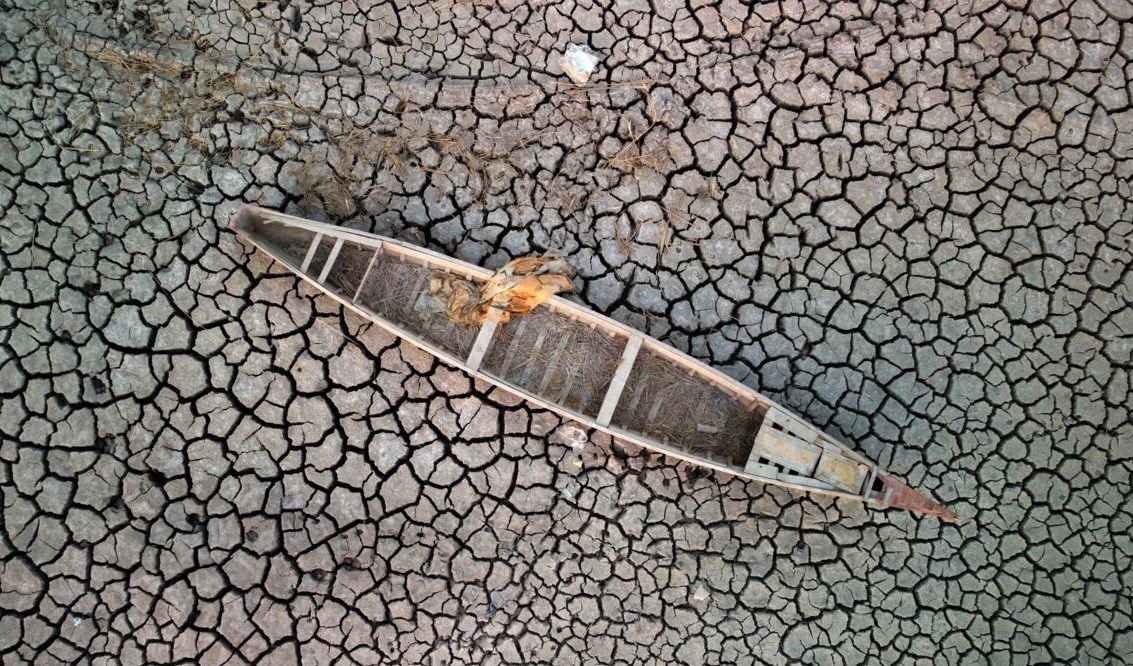Climate crisis put millions at risk of displacement in Middle East
The worsening drought makes the Middle East the most water-stressed region in the world.
-

The global heat and its repercussions are threatening the displacement of thousands. (AFP)
The Middle East is the world's most water-stressed region, with climate change threatening to displace millions of people due to low rainfall, intense heat waves, and worsening drought.
Head of the farmers' syndicate in Egypt, which will host the COP27 global climate summit in November, Hussein Abu Saddam, told AFP that he has already observed an exodus from the countryside brought on by the changing climate.
Agriculture in Egypt -- "one of the most arid countries in the world" -- has grown even less profitable because of new climate-linked hazards such as "the appearance of new parasites," he said.
"Young people from rural areas are migrating abroad or to big cities to work in industry."
Climate change is caused by human-induced #greenhouse emissions and other factors.
— Al Mayadeen English (@MayadeenEnglish) July 22, 2021
What can we do to help solve the #ClimateCrisis? pic.twitter.com/BZLEZrqqmV
"Roughly 90 percent of refugees come from countries that are the most vulnerable and least ready to adapt to the impacts of climate change," according to the UN refugee agency (UNHCR).
"If people can't farm, if people can't work, if people can't find food, they have few alternatives to displacement," Amy Pope, deputy director of the International Organization for Migration (IOM), told AFP.
According to her, "nearly three million people" were compelled to flee their homes in Africa and the Middle East in 2021 due to natural calamities. "And the situation is only going to get worse."
Rising sea level
According to researchers, Egypt's already overburdened agricultural sector could experience a 47% decline by 2060.
Florian Bonnefoi, a research fellow at the Centre for Economic, Legal and Social Study and Documentation (CEDEJ) in Cairo, claims that "the attractiveness of urban life, the city, and the services that are available there" are additional factors that contribute to rural-urban migration in addition to "the decline in agricultural production".
If nothing is done to stop it, the World Bank predicts that 216 million people would be internally displaced due to climate change worldwide by 2050, including 19.3 million people in North Africa.
Read next: African climate crisis should be 'supreme concern' to world: Report
According to the European Institute of the Mediterranean, 7% of people in North Africa live fewer than five meters (16 feet) above sea level, where densely populated beaches are among the most at risk from rising waters (IEMed).
Populations will naturally converge on big cities such as Cairo, Algiers, Tunis, Tripoli, the Casablanca-Rabat area, and Tangier. But these "hotbeds of climate migration," the World Bank warns, are themselves vulnerable to rising waters.
For instance, if the sea level rises by half a meter, two million people—nearly a third of Alexandria, Egypt's population—may be relocated, and 214,000 jobs could be destroyed.
Read next: Heatwaves will render planet uninhabitable: UN, Red Cross report

 3 Min Read
3 Min Read








